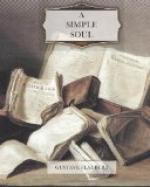It was the first time that this had ever happened, for Madame Aubain was not of an expansive nature. Felicite was as grateful for it as if it had been some favour, and thenceforth loved her with animal-like devotion and a religious veneration.
Her kind-heartedness developed. When she heard the drums of a marching regiment passing through the street, she would stand in the doorway with a jug of cider and give the soldiers a drink. She nursed cholera victims. She protected Polish refugees, and one of them even declared that he wished to marry her. But they quarrelled, for one morning when she returned from the Angelus she found him in the kitchen coolly eating a dish which he had prepared for himself during her absence.
After the Polish refugees, came Colmiche, an old man who was credited with having committed frightful misdeeds in ’93. He lived near the river in the ruins of a pig-sty. The urchins peeped at him through the cracks in the walls and threw stones that fell on his miserable bed, where he lay gasping with catarrh, with long hair, inflamed eyelids, and a tumour as big as his head on one arm.
She got him some linen, tried to clean his hovel and dreamed of installing him in the bake-house without his being in Madame’s way. When the cancer broke, she dressed it every day; sometimes she brought him some cake and placed him in the sun on a bundle of hay; and the poor old creature, trembling and drooling, would thank her in his broken voice, and put out his hands whenever she left him. Finally he died; and she had a mass said for the repose of his soul.
That day a great joy came to her: at dinner-time, Madame de Larsonniere’s servant called with the parrot, the cage, and the perch and chain and lock. A note from the baroness told Madame Aubain that as her husband had been promoted to a prefecture, they were leaving that night, and she begged her to accept the bird as a remembrance and a token of her esteem.
Since a long time the parrot had been on Felicite’s mind, because he came from America, which reminded her of Victor, and she had approached the negro on the subject.
Once even, she had said:
“How glad Madame would be to have him!”
The man had repeated this remark to his mistress who, not being able to keep the bird, took this means of getting rid of it.
CHAPTER IV
He was called Loulou. His body was green, his head blue, the tips of his wings were pink and his breast was golden.
But he had the tiresome tricks of biting his perch, pulling his feathers out, scattering refuse and spilling the water of his bath. Madame Aubain grew tired of him and gave him to Felicite for good.
She undertook his education, and soon he was able to repeat: “Pretty boy! Your servant, sir! I salute you, Marie!” His perch was placed near the door and several persons were astonished that he did not answer to the name of “Jacquot,” for every parrot is called Jacquot. They called him a goose and a log, and these taunts were like so many dagger thrusts to Felicite. Strange stubbornness of the bird which would not talk when people watched him!




